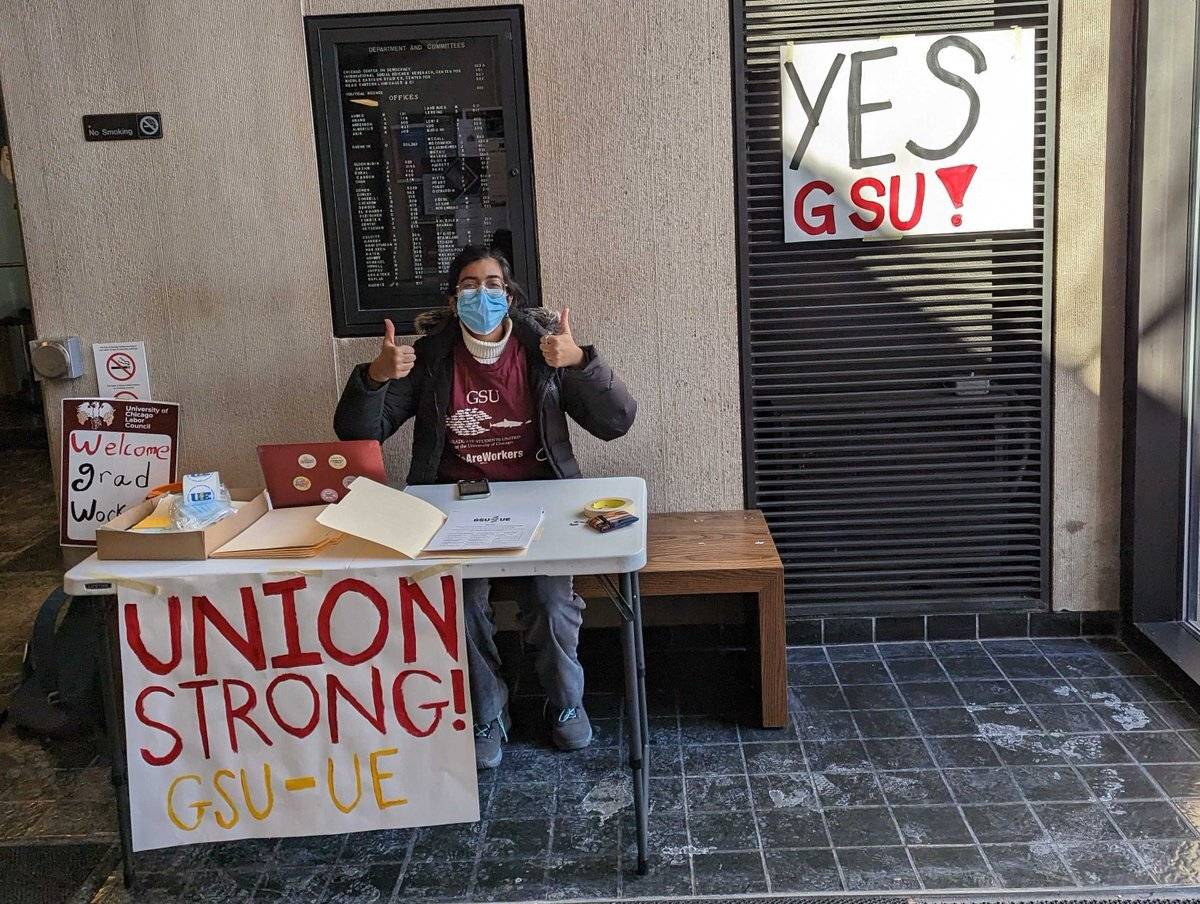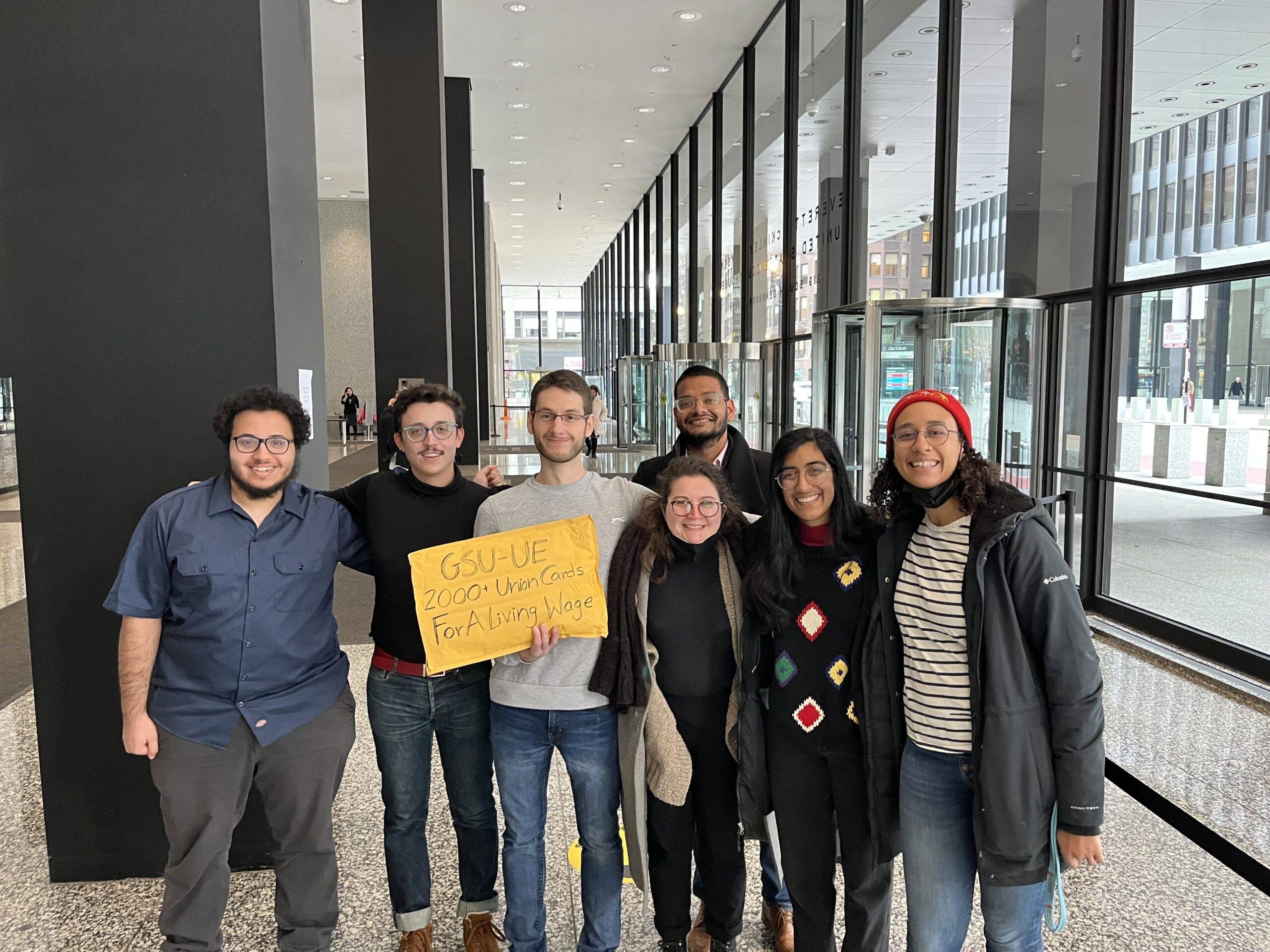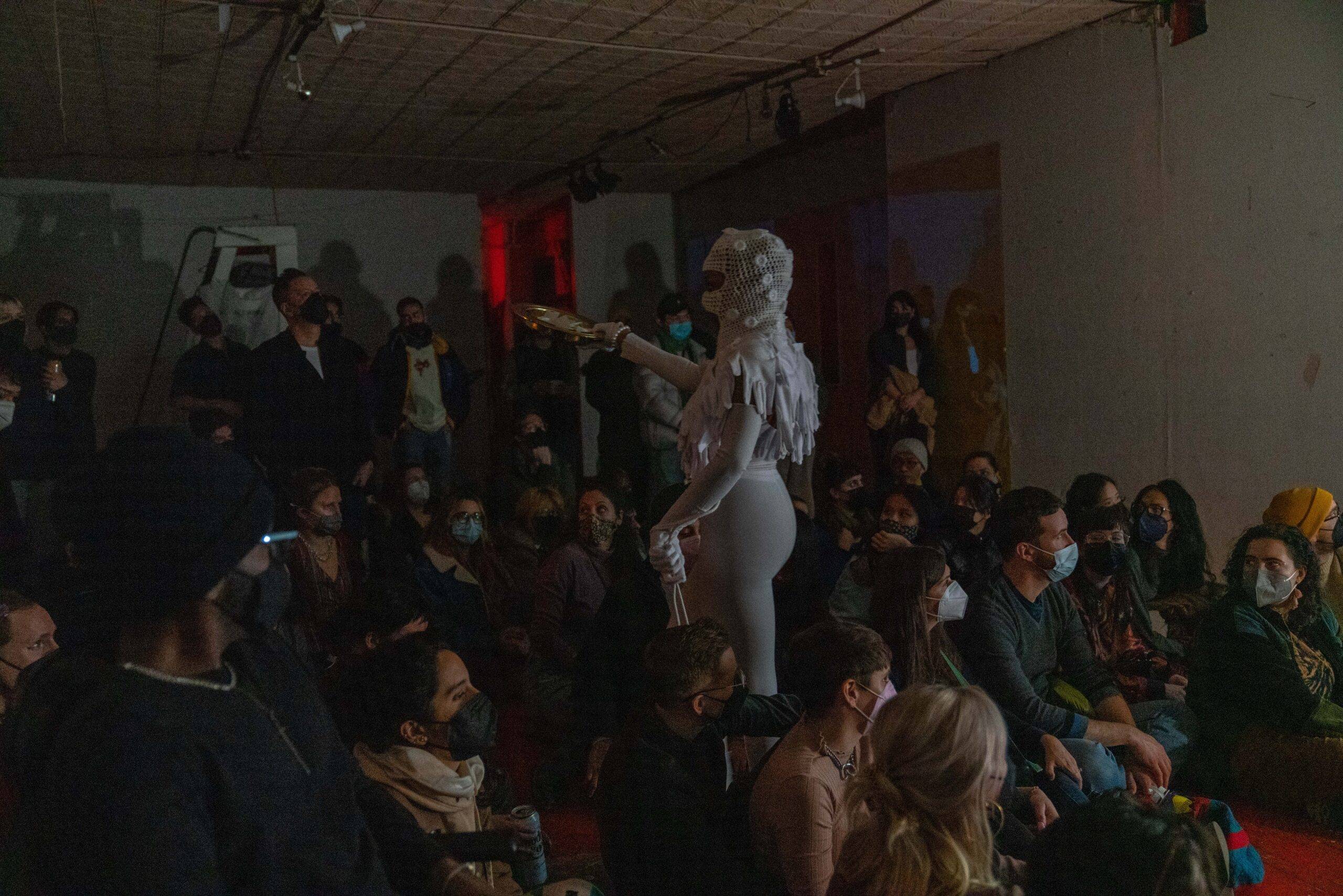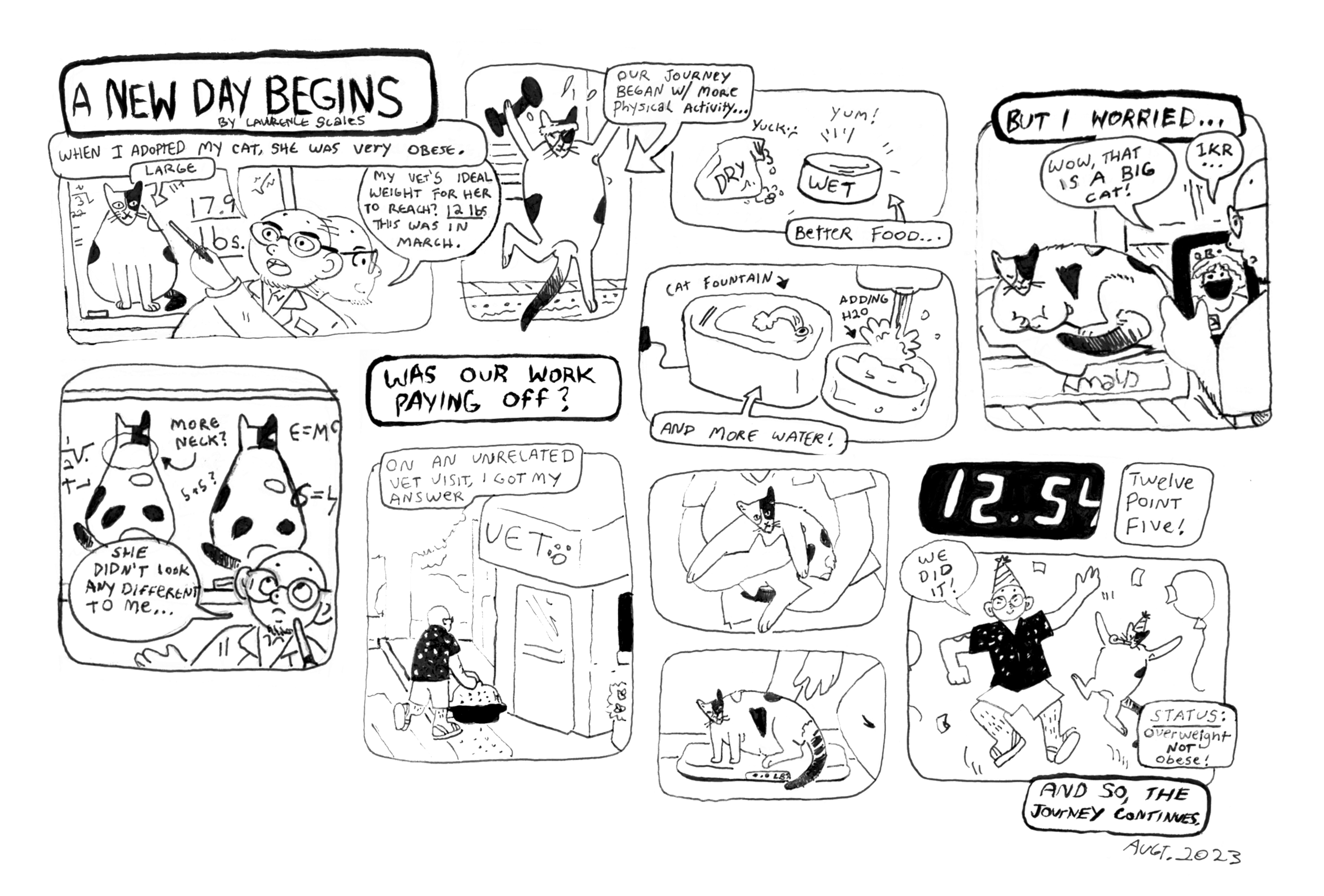
Graduate student workers at the University of Chicago won union recognition in March. Their union, UChicago Graduate Students United, is affiliated with United Electrical, Radio, and Machine Workers of America, joining the nationwide wave of student and faculty unionization.
Formed in 2007, GSU-UE took almost sixteen years to get recognition — the graduate students voted 1,696 to 155 to unionize.
Neomi Rao, co-president of GSU-UE from Spring 2022 to Summer 2023, played a key role in the union’s landslide victory. Currently a third-year doctoral candidate in political science, Rao is hesitant to take credit, citing the efforts of the many union members who campaigned vigorously. “We personally engaged with departments, visited laboratories, and interacted with individuals at their workplaces, establishing personal connections to inspire them to participate in our unionizing initiative,” Rao said.
In this interview with F Newsmagazine, Rao spoke about her journey as the former co-president of the union, what led to its success, and why she thinks unions are significant in academia.
AK: When did you start getting involved with the grad union?
NR: I started getting involved with the union when I was a masters student. It was in 2017-18. At that time Masters students weren’t included in the union. But I really wanted to get involved when I got into the UChicago campus with some type of organizing, something in leftist spaces. I also thought that joining the union would be a nice way to meet other grad students. So, I started showing up in their meetings. Like in most organizing spaces, if you show up enough, you get involved.
It was my first exposure to labor organizing. I learned a lot about just the nuts and bolts of how unions work in the U.S. The union at that time was in an interesting place. Basically, it was during the Trump administration. At that time, we had gone through a whole process of filing to form a union and had won an election. But UChicago was fighting it. And because Trump and the National Labor Relations Board were anti-union at that time, we thought that they would overturn the ruling that had allowed graduate students at private universities to unionize. We ended up withdrawing the petition from NLRB. And then the route we chose to follow was to try to pressure the university directly to voluntarily recognize the union, which they didn’t want to do. They refused to acknowledge the union’s existence at all.
So we went on a strike during the spring of 2019. While I lost touch when I completed my master’s, I rejoined the University again as a Ph.D. student in 2020. But within a year, the union became different. After the strike, they had gone through a disaffiliation process with the parent union that we had been affiliated with. It was now just kind of a group of volunteers who were angry. It was right at the beginning of the COVID, six months into the pandemic. So, people were barely holding up.
But there was this new energy around thinking about how unions could be more expansive.
We started thinking about how a union can be a force for good in this system at a university that is known for being extractive, violent, and deeply racist. That was when we started to campaign around student service fees, a fee that charged students $1,400 per year. It was unknown where the fee was going. But the more we looked into it, the fees were going to student health services, which was really startling because most of our Ph.D. programs cover our health care premium.
So we were like, why are we paying the same thing twice? Thus, we all started to agitate against it. Initially, there was just a small group of organizers. But we were able to rally in various parts of the university. We got people to sign the letter. We were pressuring the Director of Graduate Studies, which is like a faculty administrative position in each department. And many of those DGSs signed a letter to the administration advocating on our behalf. We did not think we were going to win. So we were shocked when we did win it, which was in February/March as we found out that the university was going to cancel the fee.
I think it was that moment where we got together, and we’re like, it would be a great opportunity to kickstart a campaign for recognition and to become an official union. Also, the timing was right, because the Biden administration came into power, and NLRB was now supportive of unions. So we reached out to different parent unions. We really liked UE’s principles and values. We felt that they aligned with us.
AK: Can you walk us through your journey as the co-president of the union?
NR: I became co-president in the spring of 2022. And that was right when we were in talks with UE to affiliate. I knew this was going to be a really big year for the union.
But I just had no actual understanding of how big we would be, because we literally went from having like our meetings be attended by like 50-60 people to then being attended by like 300 people. This was like a complete leveling up in a way that I was not prepared for.
But it was so powerful to see. And we organized for the election, over 3,500 of our co-workers voted like that’s incredible. I feel very lucky to have been a part of it.
I feel like I learned a lot and I’m really just so grateful to my friends and co-workers and comrades because we couldn’t have done it without them. Like it was such a huge effort that was really like being run by us. UE was giving us advice but it was we who did everything.

AK: Unionizing in academia can be really challenging. Could you discuss some of the key challenges the union members faced while building and leading the union campaign at UChicago?
NR: I feel like we met with so many different types of challenges. One type of challenge was just the actual challenge of organizing. Like, how do we get into places? How do we find people who are willing to do this? How do we have conversations where we really activate people around these issues?
But we had fellow organizers who were literally walking through the buildings at UChicago, knocking on the doors of grad students and talking with them. We were building relationships, having conversations, and getting people who then are in those places to also start doing that with their co-workers. That was really remarkable.
The other challenge was there were a lot of moments when we had to think about how to navigate conflict. People are bound to have opinions. They are bound to disagree. Like, how do you build a culture where we can disagree with each other, but we can still move forward together? I think that was a huge learning experience. We definitely had a lot of moments where we were like, at some point, it’s not worth your energy to engage with people who are not willing to move forward together. And that’s okay. We have to kind of pick and choose where we put your energy and have principles at the end of the day, too.
AK: What are the primary goals of UChicago’s grad student union?
NR: So right now we are bargaining for the contract. We have an elected bargaining committee, who are negotiating with the administration for a contract. Our demands include a living wage
that increases with the cost of living increases. We also want health care that is full coverage, because currently, we don’t get dental or vision care.
And then there are other types of services we are demanding. For instance, students who are parents only get a 2,000 dollar stipend per year, which is literally nothing.
So, we want the university to provide free childcare for parents.
International student support is something we care about. We want to make sure international students can come here without having to just pay a ton out of pocket before they get their first paycheck. We want the university to provide more legal support to them as well.
The fifth and final thing we want is like having transparency and democracy. What we mean is having decision-making power. Right now, decisions are made in rooms that we don’t have access to. And a lot of it has impacts on the community. Basically we want to have a say on what is safe, healthy, and good for the community.
AK: The movement to unionize among grad students and academic workers has been gaining momentum across the country. In your opinion, what are the driving factors behind this trend?
I think it’s several things. The overarching factor is, we are part of a generation now that has seen the failed promises of all of these types of systems. Decades ago, you used to get a job after your grad school. But that is no longer the case. It is very precarious. People do not have that guarantee, and a lot of people end up in really awful positions after they do a great job, potentially, as a grad student.
So I think there’s this just increased sense of precarity that is being felt generationally across all the sectors. And perhaps that is animating other union efforts that you are seeing in Starbucks, Amazon, in newsrooms, in nonprofits, and museum spaces.
Furthermore, the pandemic also played a major role in making people realize how institutions failed us and that we can’t rely on them to take care of ourselves. Perhaps these are the reasons why there’s a shift in people’s mindset. There’s a general disillusionment with neoliberalism people are feeling and they are finding ways to take care of themselves.
AK: What advice would you offer to students at the School of the Art Institute of Chicago who might be interested in unionizing in future?
NR: Firstly, talk to your co-workers. Find out the issues that are bothering people the most. Then start thinking about how the union might be able to act on that. Let’s say, if everyone is complaining about certain fees. Or there are people who are forced to work in certain conditions that are not feasible. Whatever it is, talk with your co-workers. Connect with them. Build relationships with them. Only then start mapping your organization. You have to know who people are, where they are. And you have to start getting a sense of who is interested, who is against. That’s the kind of progression you should look forward to.
AK: What role can unions play in academia and in the university system? Why are they important?
NR: Academics sometimes think of themselves as god, as if they are some kind of sage, filled with wisdom. Then there’s this kind of mindset among them like unions are not for us; they are for factory workers. Honestly, we should destroy this kind of mindset.
Academia like any other space is a part of this neoliberal system. There’s money floating in and out. There’s all kinds of hedge fund, real estate company kind of behavior happening in academic institutions. We need to take power back from these neoliberal influences, from these hedge-fund-run, board of trustees managers. We need to run it the way it should be; that is, education as a fundamental right that everyone should have access to. And unions allow us to do that. Unions allow us to act collectively and get big concessions from the university. We, the workers, can take our power back through unions.







